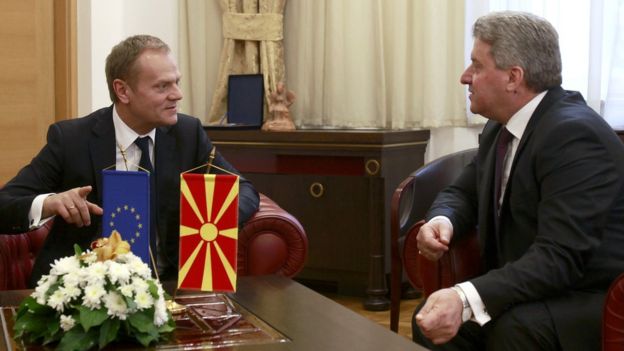European Council President Donald Tusk has warned illegal economic migrants against coming to Europe, during a new push to solve the EU migrant crisis.
He said illegal economic migrants were risking "lives and money" for nothing.Mr Tusk is visiting Greece and Turkey to try to secure agreement on reducing the flow of migrants travelling west.
More than 25,000 migrants have been left stranded in Greece by a tightening of border controls to the north, raising fears of a humanitarian crisis.
On Thursday, a group of migrants blocked a railway line on the Greek side of the border with Macedonia to protest at the restrictions.
The restrictions were imposed after several Balkan countries decided only to allow Syrian and Iraqi migrants across their frontiers. Austria also decided to limit numbers.
The move effectively barred passage to thousands of people seeking to reach western Europe illegally, including Afghans as well as some more likely to be regarded as economic migrants.
Separately, UK Prime Minister David Cameron and French President Francois Hollande are meeting to discuss security and migration issues, including conditions at the French port of Calais, where thousands of migrants hoping to enter the UK have been living rough.
After meeting Greek Prime Minister Alexis Tsipras in Athens on Thursday, Mr Tusk said he was appealing to "all potential illegal economic migrants", wherever they may be from.
"Do not come to Europe," he said. "Do not believe the smugglers. Do not risk your lives and your money. It is all for nothing."
He also said EU member states must avoid taking unilateral action to deal with the migrant crisis.
Mr Cameron and Mr Hollande will hold talks in the French city of Amiens on Thursday. Along with migration, both counter-terrorism and conflicts in Libya and Syria are expected to be on the agenda.
Hours before the meeting, French Economy Minister Emanualle Macron said his country country could allow migrants travel unchecked to UK if British voters chose to leave the European Union in a June referendum.
He said an exit vote in the referendum could end a bilateral deal allowing the UK to vet new arrivals on French territory.
"The day this relationship unravels, migrants will no longer be in Calais,"said Mr Macron.
Authorities in Calais have been clearing part of a sprawling camp known as the Jungle, from where many migrants are trying to enter the UK illegally.
 Image copyright AP
Image copyright AP His visits are seen as laying the groundwork for an EU-Turkey summit on the issue on Monday.
He said earlier this week that Europe was ready to grant "substantial financial support" to countries neighbouring war-torn regions such as Syria and Iraq.
"But at the same time we expect a more intensive engagement from our partners as an absolute precondition to avoid a humanitarian disaster. This will be the subject matter of my talks in Turkey this Thursday and Friday," he said.
Turkey has expressed frustration at the lack of a common position from the EU on the crisis.
BBC Europe Correspondent Chris Morris, who is on the Greek island of Lesbos where 75,000 migrants have already arrived so far this year, says the EU wants to see arrivals in Greece drop below 1,000 a day.
New figures suggest last year's total of one million seaborne migrants arriving in Europe could be matched well before the end of the year.

On Wednesday only about 200 Syrian and Iraqi refugees were allowed to cross. More migrants are en route from Athens.
Earlier this week, the European Commission adopted plans to distribute €700m (£543m; $760m) of emergency humanitarian funding between 2016-18 to help tackle the crisis.
Under the plan, which still needs approval by the European Council and Parliament, EU aid agencies would for the first time work directly with the UN and other groups inside Europe, using monies usually allocated to emergencies outside the bloc.
Greece has asked the European Commission for nearly €500m in assistance to help care for 100,000 asylum seekers.
credit bbc.co.uk
No comments:
Post a Comment